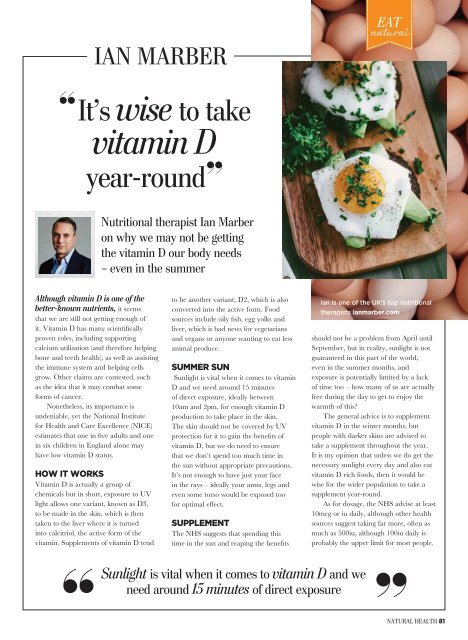You also want an ePaper? Increase the reach of your titles
YUMPU automatically turns print PDFs into web optimized ePapers that Google loves.
IAN MARBER<br />
EAT<br />
natural<br />
“It’s wise to take<br />
vitamin D<br />
year-round”<br />
Nutritional therapist Ian Marber<br />
on why we may not be getting<br />
the vitamin D our body needs<br />
– even in the summer<br />
Although vitamin D is one of the<br />
better-known nutrients, it seems<br />
that we are still not getting enough of<br />
it. Vitamin D has many scientifically<br />
proven roles, including supporting<br />
calcium utilisation (and therefore helping<br />
bone and teeth health), as well as assisting<br />
the immune system and helping cells<br />
grow. Other claims are contested, such<br />
as the idea that it may combat some<br />
forms of cancer.<br />
Nonetheless, its importance is<br />
undeniable, yet the National Institute<br />
for <strong>Health</strong> and Care Excellence (NICE)<br />
estimates that one in five adults and one<br />
in six children in England alone may<br />
have low vitamin D status.<br />
HOW IT WORKS<br />
Vitamin D is actually a group of<br />
chemicals but in short, exposure to UV<br />
light allows one variant, known as D3,<br />
to be made in the skin, which is then<br />
taken to the liver where it is turned<br />
into calcitriol, the active form of the<br />
vitamin. Supplements of vitamin D tend<br />
to be another variant, D2, which is also<br />
converted into the active form. Food<br />
sources include oily fish, egg yolks and<br />
liver, which is bad news for vegetarians<br />
and vegans or anyone wanting to eat less<br />
animal produce.<br />
SUMMER SUN<br />
Sunlight is vital when it comes to vitamin<br />
D and we need around 15 minutes<br />
of direct exposure, ideally between<br />
10am and 2pm, for enough vitamin D<br />
production to take place in the skin.<br />
The skin should not be covered by UV<br />
protection for it to gain the benefits of<br />
vitamin D, but we do need to ensure<br />
that we don’t spend too much time in<br />
the sun without appropriate precautions.<br />
It’s not enough to have just your face<br />
in the rays – ideally your arms, legs and<br />
even some torso would be exposed too<br />
for optimal effect.<br />
SUPPLEMENT<br />
The NHS suggests that spending this<br />
time in the sun and reaping the benefits<br />
Ian is one of the UK’s top nutritional<br />
therapists ianmarber.com<br />
should not be a problem from April until<br />
September, but in reality, sunlight is not<br />
guaranteed in this part of the world,<br />
even in the summer months, and<br />
exposure is potentially limited by a lack<br />
of time too – how many of us are actually<br />
free during the day to get to enjoy the<br />
warmth of this?<br />
The general advice is to supplement<br />
vitamin D in the winter months, but<br />
people with darker skins are advised to<br />
take a supplement throughout the year.<br />
It is my opinion that unless we do get the<br />
necessary sunlight every day and also eat<br />
vitamin D rich foods, then it would be<br />
wise for the wider population to take a<br />
supplement year-round.<br />
As for dosage, the NHS advise at least<br />
10mcg or iu daily, although other health<br />
sources suggest taking far more, often as<br />
much as 500iu, although 100iu daily is<br />
probably the upper limit for most people.<br />
Sunlight is vital when it comes to vitamin D and we<br />
need around 15 minutes of direct exposure<br />
NATURAL HEALTH 81


















